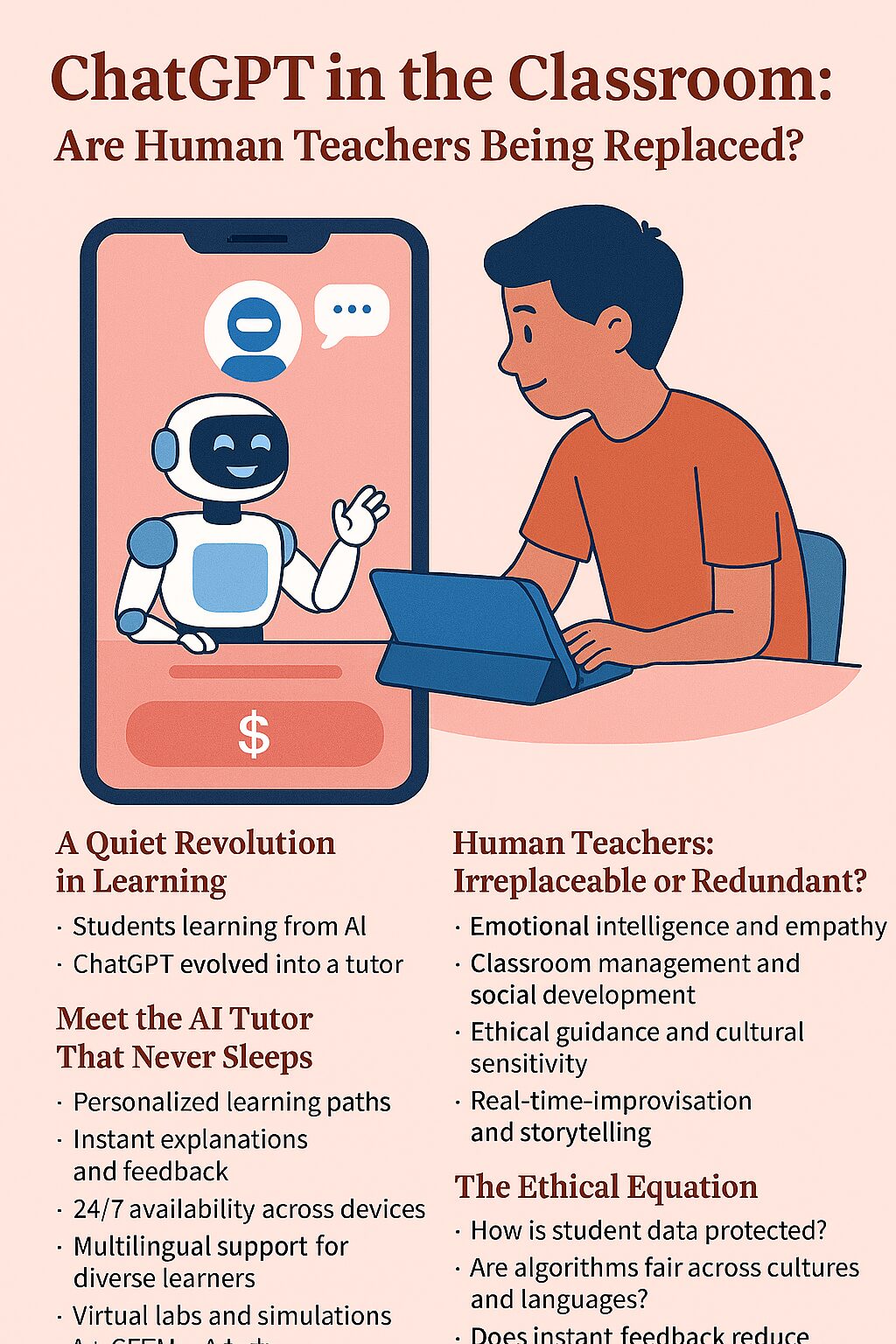Introduction
The education sector is undergoing a profound transformation. In 2025, AI-powered tutors like ChatGPT are reshaping how students learn, access knowledge, and receive academic support. With personalized learning, 24/7 availability, and instant feedback, many are asking: Are we witnessing the end of traditional teaching?
🤖 What Are ChatGPT Tutors?
ChatGPT tutors are AI-driven platforms that use natural language processing (NLP) and machine learning to simulate human-like teaching. These virtual educators can:
- Answer questions in real time
- Provide personalized explanations
- Generate quizzes and assignments
- Offer feedback and revision support
- Adapt to individual learning styles
From homework help to exam prep, ChatGPT is becoming a digital companion for millions of students worldwide.
📊 How AI Is Reshaping the Classroom
| AI Capability | Educational Impact |
|---|---|
| 🧠 Adaptive Learning | Tailors content to student pace and comprehension |
| 🕒 24/7 Availability | Supports learning beyond school hours |
| 📈 Performance Analytics | Tracks progress and identifies learning gaps |
| 🗣️ Multilingual Support | Assists non-native speakers with translation and grammar |
| 🧪 Simulated Labs | Enables virtual experiments in STEM subjects |
AI tutors can reduce the student-teacher ratio burden and democratize access to quality education.
🧑🏫 Can ChatGPT Replace Human Teachers?
While AI tutors offer efficiency and scalability, they lack the emotional intelligence, mentorship, and cultural sensitivity that human educators provide. Teachers play critical roles in:
- Motivating and inspiring students
- Managing classroom dynamics
- Providing emotional support
- Navigating ethical and social issues
Experts suggest that AI should augment, not replace, human teachers. The ideal model is a hybrid classroom, where educators use AI tools to enhance learning outcomes.
🌍 Global Adoption & Trends
- India is integrating GPT-powered tutors to address teacher shortages
- EdTech platforms like Byju’s, Vedantu, and Khan Academy use AI for doubt resolution and personalized revision
- UNESCO reports that AI improves test scores but may reduce long-term retention
- Stanford studies show an 8–12% improvement in student performance with AI tutors
AI is especially impactful in underserved regions, bridging gaps in access and quality.
⚠️ Challenges & Ethical Concerns
Despite its promise, AI in education raises important questions:
- 🔐 Data Privacy: How is student data stored and used?
- ⚖️ Algorithmic Bias: Are AI models fair across cultures and languages?
- 🧠 Critical Thinking: Does instant feedback reduce deep learning?
- 💼 Job Displacement: Will AI replace junior educators in budget schools?
Educators and policymakers must ensure ethical AI deployment and transparent governance.
🔍 SEO Tips for EdTech Content Creators
✅ High-Impact Keywords
- “AI in education 2025”
- “ChatGPT tutors in schools”
- “AI replacing teachers”
- “adaptive learning platforms”
✅ Metadata Optimization
- Meta Title: “AI in Education: ChatGPT Tutors Replace Teachers?”
- Meta Description: “Explore how ChatGPT and AI tutors are transforming classrooms, and whether human teachers are being replaced in 2025.”
✅ Structured Formatting
- Use headings, tables, and bullet points for readability
- Include alt text for visuals (e.g., “ChatGPT tutoring a student on a tablet”)
Conclusion
AI tutors like ChatGPT are revolutionizing education—offering personalized, scalable, and accessible learning experiences. But while algorithms can teach facts, they can’t replace the empathy, mentorship, and inspiration that human teachers provide.
The future of education lies not in choosing between AI and humans, but in collaboration—where technology empowers teachers and students alike.

